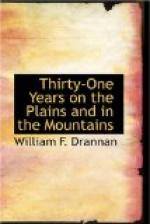The most intelligent one spoke up and said: “Give me one string of beads and one butcher knife for the trip already made, and give me one butcher knife for the next trip.” I then asked the others if they were satisfied with that, and they said they were; so I paid them off by giving them a butcher knife that cost about fifty cents in St. Louis and one string of beads that would perhaps cost ten cents. They thought they had been well paid for their trouble, and I could see that they had not expected so much. This was no doubt their first experience in hiring out.
The next morning Col. Bent and Mr. Roubidoux said to Jim and I: “Now boys, we will make you a present,” telling us that their horses were in the corrall, and for us to go and pick out a saddle horse apiece. They told us that all the horses in the corrall were theirs, and we might take our choice, and that we could turn our other horses into the herd for as long as we liked.
I selected a black horse and saddled him, and he seemed to be quiet and gentle.
There were some trappers at the fort who were going to South Park to trap the following winter. When I led the horse out to get on him they asked if it was mine. “Yes,” I said. They asked what price I had set on him, and I said one hundred dollars. They said they would give me that for him if I would wait for my money until spring when they returned from South Park. I asked them if they were going to trap for Col. Bent and Mr. Roubidoux, and they said they were. We then walked into the store and I asked Col. Bent and Mr. Roubidoux if they would go these men’s security for one hundred dollars. They said they would, and I told the trappers the horse was theirs. Mr. Roubidoux asked me if it was the horse he had given me. I told him it was and he said: “You did well, for I bought that horse of an emigrant last summer and have never been able to get any money out of him. I think you will have to take a lot of my horses to sell on commission, for I see right now you can beat me selling horses all hollow.”
We remained at the Fort three days this time, after which we rigged up and started for the Kiowa nation again with more goods to trade for buffalo robes. We made the trip in eleven days, being the quickest we had yet made over the road.
We found the chief in an excellent humor, and he was as well pleased over his new butcher knife as a boy would be over his first pair of red topped boots.
We found the Indians anxious to trade robes for our trinkets and we had no trouble in getting a load and more than we could pack again. We made five trips that fall and winter with the very best success, keeping those same four Indians with us all winter.
CHAPTER XXII.
A trip to fort Kearney—the general endorses us and we pilot an emigrant train to California.—Woman who thought I was “No gentleman.”—A camp dance.




